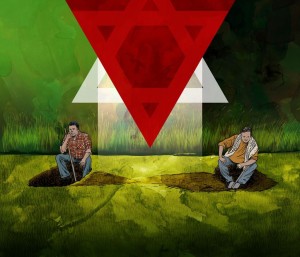I wrote this piece awhile back, but today my feature article for Christ and Pop Culture Magazine–on nurturing peace in the Israeli-Palestinian conflict through film–has been made available for free.
At a moment in history where more people around the world have been displaced by violent conflict than ever before, now is the time to ask ourselves hard questions about our role in cultivating conflict or peace. Now is the time to question the narratives we tell ourselves about war, vengeance, “redemptive” violence, and enemies. The same ignorance and fear that generates war in the Middle East and Africa and pushes refugees to the shores of Europe and North America also plays out in our own society as alienation between people of different races or faiths, and as destructive relationships between individual people. Forgiveness of others’ sin, and repentance for our own, are both central to the Christian faith. So for those of us who seek to be shaped by the life of Jesus, enemy love and reconciliation should be central to our understanding of our role in the world.
As a Jew, Reena Lazar has worked towards reconciliation in Israel/Palestine by finding creative ways to bring Israeli and Palestinian youth face-to-face with “the enemy” (each other). Yet the wisdom she has accumulated in the process is applicable far beyond the scope of this particular geopolitical conflict. Her work has much to teach us about building bridges instead of walls, regardless of the role or the part of the world in which we find ourselves. Head on over to Christ and Pop Culture to read the article.
